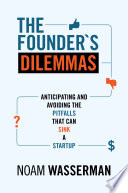

The book emphasizes that the decisions made by founders at the early stages of their ventures can have long-lasting implications for the company. Founders face numerous dilemmas, from choosing the right co-founders to deciding on equity splits, which can significantly influence the startup's trajectory. These decisions are often made under pressure and with limited information, making it crucial for founders to understand the potential consequences of their choices. The author provides case studies and research findings to illustrate how these early decisions can affect team dynamics, company culture, and ultimately, the success or failure of the startup.
Continue readingCo-founder relationships are central to the success of a startup. The book discusses how the selection of co-founders can lead to either harmony or conflict. Founders must consider compatibility in terms of skills, work ethics, and values. Additionally, the book highlights the importance of establishing clear roles and responsibilities to prevent misunderstandings. It also delves into the emotional aspects of co-founder relationships, suggesting that personal dynamics can often be as critical as professional qualifications. Founders are encouraged to engage in open communication and to establish a framework for resolving conflicts when they arise.
Continue readingThe allocation of equity among founders is a pivotal decision that can lead to disputes later on. The book explores various equity distribution models and the psychological implications of ownership stakes. Founders often struggle with how to fairly divide equity, especially when considering the contributions of each member. The author stresses the importance of transparency and fairness in these discussions to prevent resentment and potential fallout. The book provides practical frameworks for determining equity splits that align with the contributions and expectations of each founder, thereby fostering a more collaborative environment.
Continue readingThe early hiring decisions made by founders can shape the culture and performance of the startup. The book emphasizes the importance of hiring individuals who not only possess the necessary skills but also align with the company's vision and values. It discusses the challenges of scaling a team and the potential pitfalls of rapid hiring. Founders are advised to prioritize cultural fit and to develop a strong onboarding process to integrate new hires effectively. The author also highlights the significance of diversity in teams, arguing that diverse perspectives can drive innovation and improve problem-solving capabilities.
Continue readingSecuring funding is a critical aspect of a startup's journey, and the book outlines the various dilemmas founders face in this arena. Founders must decide between bootstrapping, seeking venture capital, or exploring alternative funding sources. Each option comes with its own set of trade-offs, including control over the company and the pressure to achieve rapid growth. The author provides insights into the mindset of investors and what they look for in startups. Founders are encouraged to align their funding strategies with their long-term goals and to understand the implications of their choices on company culture and operations.
Continue readingThe book discusses the importance of having a clear exit strategy from the outset. Founders should consider their long-term vision for the company and how they plan to achieve it. This includes understanding the potential paths for exit, whether through acquisition, IPO, or other means. The author emphasizes that having a well-defined exit strategy can guide decision-making throughout the startup's lifecycle. Founders are encouraged to align their personal goals with the company's trajectory to ensure that they are building a venture that fulfills their aspirations.
Continue readingFounders often face significant emotional and psychological challenges as they navigate the complexities of building a startup. The book highlights the stress, uncertainty, and isolation that can accompany entrepreneurship. It discusses the importance of mental resilience and the need for founders to seek support, whether through mentorship, networking, or professional counseling. The author underscores that acknowledging and addressing these challenges is crucial for maintaining well-being and ensuring sustained focus on the business. Founders are encouraged to build a support system and to prioritize self-care as they embark on their entrepreneurial journey.
Continue readingThe reading time for The Founder's Dilemmas depends on the reader's pace. However, this concise book summary covers the 7 key ideas from The Founder's Dilemmas, allowing you to quickly understand the main concepts, insights, and practical applications in around 23 min.
The Founder's Dilemmas is definitely worth reading. The book covers essential topics including The Importance of Founders' Decisions, Co-Founder Relationships, Equity and Ownership Structures, providing practical insights and actionable advice. Whether you read the full book or our concise summary, The Founder's Dilemmas delivers valuable knowledge that can help you improve your understanding and apply these concepts in your personal or professional life.
The Founder's Dilemmas was written by Noam Wasserman.
If you enjoyed The Founder's Dilemmas by Noam Wasserman and want to explore similar topics or deepen your understanding, we highly recommend these related book summaries:
These books cover related themes, complementary concepts, and will help you build upon the knowledge gained from The Founder's Dilemmas. Each of these summaries provides concise insights that can further enhance your understanding and practical application of the ideas presented in The Founder's Dilemmas.